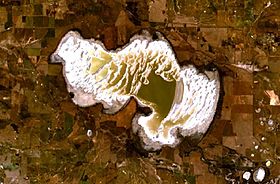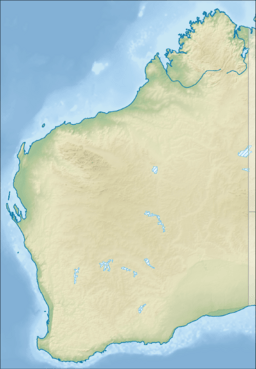Dumbleyung Lake facts for kids
Quick facts for kids Dumbleyung Lake |
|
|---|---|

View from space
|
|
| Location | Great Southern, Western Australia |
| Coordinates | 33°20′S 117°39′E / 33.333°S 117.650°E |
| Type | Salt lake |
| Primary inflows | Coblinine River system |
| Basin countries | Australia |
| Designation | Dumbleyung Lake Nature Reserve |
| Max. length | 13 km (8.1 mi) |
| Max. width | 6.5 km (4.0 mi) |
| Surface area | 52 km2 (20 sq mi) |
| Average depth | 2.35 m (7.7 ft) |
| Max. depth | 4.57 m (15.0 ft) |
| Surface elevation | 255 m (837 ft) |
Dumbleyung Lake, also called Lake Dumbleyung, is a large salt lake in the Great Southern part of Western Australia. It is about 13 km (8.1 mi) long and 6.5 km (4.0 mi) wide. The lake covers a total area of 52 km2 (20 sq mi).
Contents
About Dumbleyung Lake
First People and Early History
The Noongar peoples are the traditional owners of the land around Dumbleyung Lake. For them, the lake is part of a special dreaming trail. This trail stretches from the south coast near Augusta all the way to the Great Victoria Desert in the northeast. Other important places along this trail include Mulka's Cave, Wave Rock, Jilakin Rock, Jitarning Rock, and Puntapin Rock.
Explorers Henry Landor and Henry Maxwell Lefroy are often given credit for finding Dumbleyung Lake. However, it might have been on a map as early as 1839, called Kondening Lake. In 1875, George Kersley was the first person to get permission to use the land around the lake for grazing animals.
World Record on the Lake
Dumbleyung Lake became famous around the world on 31 December 1964. On that day, Donald Campbell broke the world water speed record right here! He traveled at an amazing 444.66 km/h (276.3 mph) in his special boat, the Bluebird K7. You can visit a memorial made of granite for Campbell at Pussy Cat Hill. This spot offers a great view of the entire lake.
Lake Today: Saltiness and Wildlife
In more recent times, the soil around the lake has become much saltier. This process is called salination. Because of this, the land is no longer good for grazing animals. Today, people mostly use the lake for fun water activities.
Even though the lake is very salty, it is home to many different kinds of water birds. Since 1963, the lake has been protected as the Dumbleyung Lake Nature Reserve. This means it's a safe place for wildlife.
The lake is also recognized as an important wetland by the DIWA. This is because it acts as a safe place for waterbirds during dry times. It's also a place where Australian shelducks go to moult (shed their feathers). Dumbleyung Lake is one of five such important sites in the Avon-Wheatbelt area.
See also
Images for kids
 | Jackie Robinson |
 | Jack Johnson |
 | Althea Gibson |
 | Arthur Ashe |
 | Muhammad Ali |



